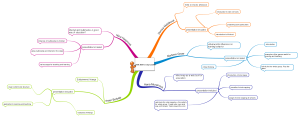Christian Kogler- Dreaming of producing film? – 72 hours to produce the educational video
– introduction to competition
Petra Bauer -the use of e-learning tools in international cooperation between courses in higher education at universities
International guidelines for universities in political and economic fields – suggestions:
intercultural competences, media literacy, OER for students, interdisciplinary way of learning
– target of Bologna process – employability – output orientation+ training of expert knowledge, slef-reflection, method skills, communication skills, etc.
They cooperate with two universities – Finnish and Greece
they use LMS: Olat – international parts: virtual introduction, social exchange, …
social exchange – many topics in the forum: Finnish culture, Use of new media, Christams in Tampere, Finnish and German cooking, Copying with the darkness, etc.
Assesment for the German students was made by e-portfolio
problems with international cooperation: time management, acceptance of credit points
work in group – discussion – our question:
Do we need a LMS or should we use open social media?
We came out with these suggestionsI ideas:
- LMS: is it used to the full extend?
- Data Security Questions connected to the use of social media for data exchange
- Personal Blog as an system combining PLE and OER
Wilke Held – The political village 2.0
2 parts: The political village – aim of the method, procedure without web support
The political village 2.0
3 steps: discovery, systemizing, applying
Wilke has been a great presenter and came with very interesting topic. In my opinion political education is very important.
There are different political simulation games, for children as well as for students in higher education, the time needed can vary from a few hours to several weeks, some of these are even on an international level, depending on who organizes the simulations
Evolution of the method: technically, didactically
Advantages of the village 2.0
Discussion
Jennifer Hoff – Chances and Limits of the Interactive Whiteboard in the Classroom
Importance of media duirng lessons: time saving, growth of knowledge, etc.
What do we have to do before starting?: teacher as a guide and moderator- no omniscience, unpredectible lessons, cooperation of different subjects, etc.
Possibilities: older pupils can help younger ones, activation supports memory,etc.
Problems (interactive whiteboard) – different type of writing, teachers use them despite the fact,they do not know how to use them.
Regarding Slovak situation, I know that teachers do not have many experience in using whiteboard, moreover I think that not many schools are provided with them. I absolutely agree with Jenny´s opinion that it shouldn´t be used in the classroom till the teacher who uses it is not real “professional” in that. But it is a very good tool, especially for me as a future English teacher – very useful for vocabulary, grammar (e.g. putting sentences into correct order, filling the gaps,etc.), also for speaking, e.g. students have some task and do it on the whiteboard while they are explaining the procedure. But on the other hand, it takes so much time for teachers to prepare smth, they have to be thus very patient ( like in everything that teaching involves).
Marie – Christine Hensel – More Transparency= More Motivation?
How can pupils be convinced that the given marks are fair and represent their achievements? – discussion. In my opinion, we have to give the criteria at the beginning of the semester/ academic year and strictly follow them, I mean not to prioritize or underestimate anybody.
On our backchannel many interesting questions appeared and issued a zealous discussion about grading children in the school with marks only or also with some feedback -e.g. oral. In my opinion, some feedback is very important not only for child, but also fot parents, but unfortunately some parents care only about marks.
Tobias Bahert – More Engagement with gamification – More Transparency II
Let´s discuss! – Motivation – is a process, is personal, has a direction, Bela is energizing!! 🙂
Types of motivation
Game based learning?!
Great presentation, we didn´t have an opportunity to talk about motivation so much, although it is so important issue connected to education. Of course, the way Toby did his presentation was great and funny, he´s a great presenter 🙂

